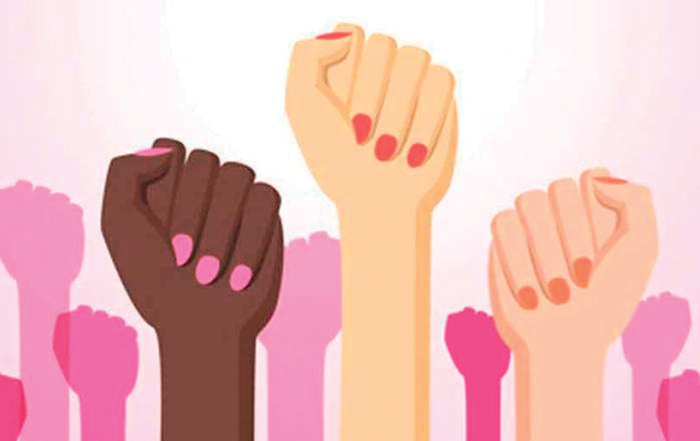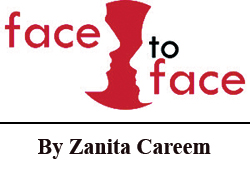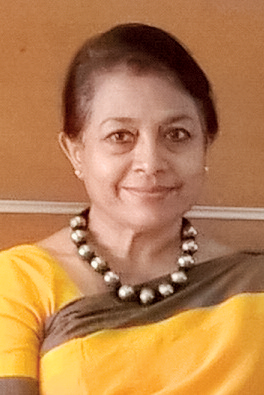Life style
Politics is still dominated by men in Sri Lanka

By Zanita Careem

In an interview with Dr. Deepika Udagama, Sri Lanka Professor of Law at the University of Peradeniya, she said women in politics are essential for representative governance. However while global statistics for female representation in governments worldwide continues to improve, equal participation of women in Sri Lanka is still a far fetched goal. Here are excerpts of the interview.
We received the right to vote in 1931, gave the world its first woman PM. Sri Lanka still remains hopelessly behind in terms of equal representation of women in politics both local and at national level? Your opinion
First, let’s recognize that women’s political representation is essential not just as an end but as a means to an end. Women’s increased participation in politics is required for women to be heard at various policy-making levels so that their issues and concerns and lived realities are factored into decision-making.

Dr.Deepika Udagama, Professor of Law at University of Peradeniya. She served previously as the Chairperson of the Human Rights Commission
It is encouraging to observe a surge in the number of women elected to parliament at the recent General Election. My understanding is that 21 women have been elected to Parliament (19 from NPP and 02 from SJB), and there may be a few more named in the National Lists. However, the numbers are still very insignificant given that women constitute nearly 52% of the national population and form the bulk of the voters. One could also observe the large numbers of women enthusiastically participating in election rallies in recent months. Who can forget the dynamic role played by women in the Aragalaya? However, it appears that women are eventually counted on for their votes, not so much for the contribution they can make as political representatives to national development.
It’s no secret that there wasn’t a single female candidate at the recent Presidential Election as well. We also know that there have been very few women parliamentarians appointed as cabinet ministers in the past. Despite the recent increase in the number of elected women MPs, the current cabinet too has only two women, including the Prime Minister. It is very disappointing to note that there isn’t a single woman among the Deputy Ministers.
It is also observed that, women cabinet ministers in Sri Lanka have yet to be assigned portfolios that are conventionally considered to be ‘important’ such as finance, defense and foreign affairs although our South Asian neighbors have made those advances. I do believe that after President Kumaratunga this is the first time a female minister is in charge of education. Such marginalization is a travesty, especially in a country which boasts around 92% female literacy and over 60% female students in public universities.
In the past few Parliaments of Sri Lanka, women’s representation hovered around 5.3%. Now it may go up to perhaps 10%-12% depending on the number of women coming in through the national lists of parties. Compare that with the present 33.1% female MPs in Nepal and 20% in Bangladesh. These are Inter-Parliamentary Union data. Of a total of 183 countries ranked as at October, 2024 , Sri Lanka stood at 175. The number 1 ranking was awarded to Rwanda with 63.8% female members of Parliament. Our ranking may go up slightly now, but as I said, in the larger scheme of gender equality in the country even the improved numbers make only an insignificant difference. However, we must build on recent gains and the 25% quota for women’s representation at the local government level introduced in 2016. We must seek quotas for parliament and provincial councils.
Challenges women face especially in the male political culture with deeply rooted social and cultural biases still exists. Do these obstacles for greater representation still persists? Your comments
Yes, of course they do. Public life is still very much a male bastion in Sri Lanka and elsewhere. We understand that gender played a role at the recent US Presidential Election where a sizeable segment of voters believed that they are still not ready for a female president. That’s due to socio-cultural factors. Some countries have, through national conversations on gender equality and with the intervention of inspiring political leaders and proactive civil society, made greater strides than others. African countries such as Rwanda and South Africa are examples.
Turning to Sri Lanka, one primary observation is that the high level of literacy among women has not necessarily translated into improving women’s empowerment in a socio-political sense. It’s almost a given fact that politics is still dominated by men. Even at the level of university student politics women are terribly marginalized. There’s yet to be a female president of a university student union or the IUSF. Patriarchy in the political party system is very much alive and well. Is there a single political party in Sri Lanka presently headed by a woman? A political party of which the General Secretary is a woman?
In contrast, who can forget the dynamic role played by large numbers of women in the Aragalaya? But come election time and party politics, that electrifying gender dynamic has not got translated into the massive shift in women’s political representation one could have reasonably expected. There’s been an improvement of course, but not a radical shift where all or most political parties felt compelled to nominate at least 1/3 of women in their nomination lists. So yes, male domination of politics and political parties is deeply structural brought on by our socio-cultural value base. At a broader level, I believe that educational reforms that focus on personality development and increase our democratic and civic consciousness is a key factor to changing these unacceptable realities aside from advocating for quotas for women in Parliament and Provincial Councils, and yes, in trade unions and student councils etc.
I feel the male model of politics and lack of internal democracy within political parties, may be some of the reasons? Your opinion
Correct. The Conventional model of politics is very male oriented. It is extremely confrontational, reliant on violence (physical, verbal, discriminatory etc.) and massive funding (whether legal or illegal) and encourages patron/client relations. A gentler and cleaner model of politics would certainly encourage female candidates. The past two elections were peaceful and dignified, so there’s future hope.
However, the questionable level of internal party democracy definitely contributes to the challenges women in politics face. Centralized party hierarchies (usually male centric) decide on all important matters including nominations, distribution of election funding, policies, strategies and so on without much consultation with rank and file. If a party does not have a strong women’s wing, women do not have much of a say in the internal decision-making. Any opportunities that come in the way of female members are viewed as concessions, not as entitlements. In Sri Lanka leadership is very personality-based and tends to be monolithic. I have always advocated constitutional or legal regulation of internal party democracy. There must be rules on non-discrimination and inclusivity within parties. How can political parties with authoritarian, non-inclusive hierarchies bring about democracy in a country?
Women make up more than half the voters but not a single women contest for Presidential elections. Financial constraints can be one of the causes for women not to take part in politics. Your opinion?
There are many forms of violence on women, psychological, sexual, physical and economic. Do these obstacles impede political participation?
. Gender equality was mentioned at the conference in Beijing in 1995 Do we follow these highlights and has Sri Lanka taken seriously these clauses? Are there any structural obstacles holding it back?
Women politicians around the world face more or less the same types of challenges, but to varying degrees. Use of violence as a political strategy always discourages women. There was a time in Sri Lanka when any politician who wanted to be ‘successful’ would have to possess a squadron of political goons. A few women became violent politicians, but others just gave up the idea of being active politicians. Hopefully, those are abominations of the past that will no longer be tolerated.
The most potent threat against women in politics is sexual vilification. It is cowardly, but in a conservative society such demeaning tactics work. It breaks the spirit of women. We’ve seen how women parliamentarians participating in debates were vilified by fellow parliamentarians in the recent past. One cannot recall formal action being taken against the miscreants. I note though that the current generation of women politicians is made of tougher metal. They will not give in or be defeated easily. However, the structural dimensions of political parties need a lot of work to achieve gender parity in politics.
Can you mention some of the steps taken by the former governments to rectify the shortcomings, have by any chance women have benefited ?
Introduction of quotas is the main method used to increase female political representation. Quotas can be introduced either at the level of nominations by parties or by reserving seats in elected bodies. The ‘Yahapalanaya’ government introduced a 25% quota for women in local government bodies. India introduced a 1/3 quota for women in the lower house of parliament and state legislative assemblies last year. A few decades ago India introduced a 1/3 quota for women in village councils (Panchayats) that has proved to be very successful. Rwanda which has the highest percentage of women in parliament at present also has adopted quotas. Around 138 countries have adopted gender quotas to increase women’s political representation.
Of course, much more needs to be done than adopt quotas. Civil society and the media should create a strong enabling environment for women to enjoy and advocate rights. Political education of women must reach a point where women actively shame and boycott political parties that marginalize women’s participation. The education system of the country must focus on creating a strong human rights ethos which includes sensitivity to non-discrimination including on the bases of sex and gender. Gender studies must be integrated into all disciplines than being confined to social sciences and humanities. Education must focus on personality development and make extra effort to strengthen women’s life experiences. Overall, the quality of women’s education must improve. Pressure must be put on political parties to create enabling environments that encourage women’s participation in politics including proactive recruitment and nurturing of young women community workers and political activists to take up active politics, political education programs for women and ensuring the inclusion of women in all decision-making bodies of parties.
One hopes that the Speaker and party leaders will create an enabling environment for women MPs to actively contribute to parliamentary affairs and punish any miscreants who belittle them. I do believe that the new women MPs are strong and smart enough to assert themselves and shout down and shame bullies and detractors. The Women’s Parliamentary Caucus should be more active and vocal on women’s issues and encourage more women to join their ranks. Much needs to be done to create a decent society where all have equal opportunities whatever one’s gender.